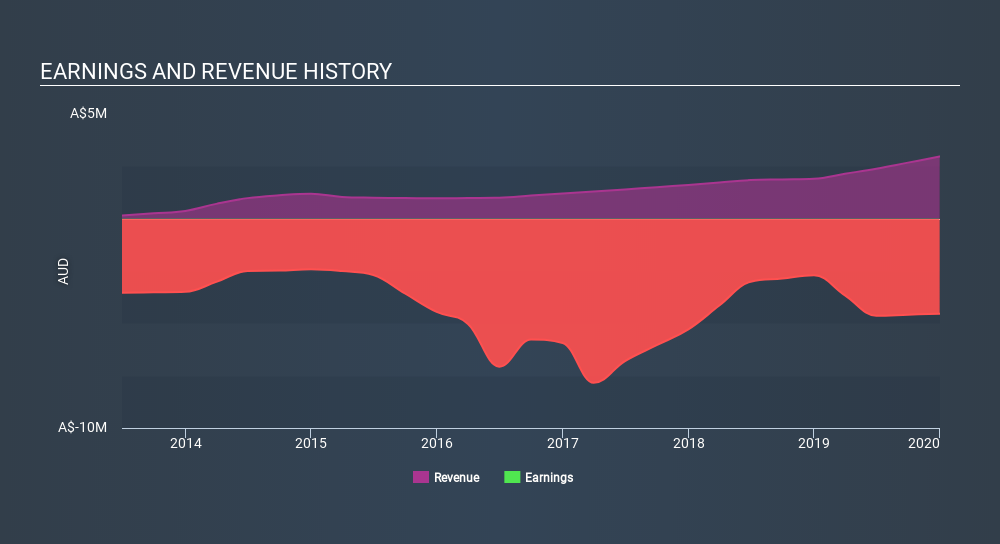If you want to know who really controls Immuron Limited (ASX:IMC), then you'll have to look at the makeup of its share registry. Institutions will often hold stock in bigger companies, and we expect to see insiders owning a noticeable percentage of the smaller ones. Warren Buffett said that he likes "a business with enduring competitive advantages that is run by able and owner-oriented people." So it's nice to see some insider ownership, because it may suggest that management is owner-oriented.
Immuron is not a large company by global standards. It has a market capitalization of AU$57m, which means it wouldn't have the attention of many institutional investors. Our analysis of the ownership of the company, below, shows that institutional investors have bought into the company. Let's take a closer look to see what the different types of shareholder can tell us about Immuron.
View our latest analysis for Immuron

What Does The Institutional Ownership Tell Us About Immuron?
Institutional investors commonly compare their own returns to the returns of a commonly followed index. So they generally do consider buying larger companies that are included in the relevant benchmark index.
Immuron already has institutions on the share registry. Indeed, they own 21% of the company. This can indicate that the company has a certain degree of credibility in the investment community. However, it is best to be wary of relying on the supposed validation that comes with institutional investors. They too, get it wrong sometimes. If multiple institutions change their view on a stock at the same time, you could see the share price drop fast. It's therefore worth looking at Immuron's earnings history, below. Of course, the future is what really matters.

Immuron is not owned by hedge funds. BNY Mellon Asset Management is currently the largest shareholder, with 14% of shares outstanding. The second largest shareholder with 6.9%, is Authentics Australia Pty. Ltd., followed by Grandlodge Pty. Ltd., with an ownership of 6.6%.
On studying our ownership data, we found that 25 of the top shareholders collectively own less than 50% of the share register, implying that no single individual has a majority interest.
Researching institutional ownership is a good way to gauge and filter a stock's expected performance. The same can be achieved by studying analyst sentiments. Our information suggests that there isn't any analyst coverage of the stock, so it is probably little known.
Insider Ownership Of Immuron
The definition of an insider can differ slightly between different countries, but members of the board of directors always count. The company management answer to the board; and the latter should represent the interests of shareholders. Notably, sometimes top-level managers are on the board, themselves.
Insider ownership is positive when it signals leadership are thinking like the true owners of the company. However, high insider ownership can also give immense power to a small group within the company. This can be negative in some circumstances.
Our information suggests that insiders maintain a significant holding in Immuron Limited. Insiders have a AU$8.0m stake in this AU$57m business. I would say this shows alignment with shareholders, but it is worth noting that the company is still quite small; some insiders may have founded the business. You can click here to see if those insiders have been buying or selling.
General Public Ownership
The general public -- mostly retail investors -- own 51% of Immuron. This size of ownership gives retail investors collective power. They can and probably do influence decisions on executive compensation, dividend policies and proposed business acquisitions.
Private Company Ownership
It seems that Private Companies own 13%, of the IMC stock. Private companies may be related parties. Sometimes insiders have an interest in a public company through a holding in a private company, rather than in their own capacity as an individual. While it's hard to draw any broad stroke conclusions, it is worth noting as an area for further research.
Next Steps:
While it is well worth considering the different groups that own a company, there are other factors that are even more important. For example, we've discovered 6 warning signs for Immuron (2 can't be ignored!) that you should be aware of before investing here.
Of course this may not be the best stock to buy. Therefore, you may wish to see our free collection of interesting prospects boasting favorable financials.
NB: Figures in this article are calculated using data from the last twelve months, which refer to the 12-month period ending on the last date of the month the financial statement is dated. This may not be consistent with full year annual report figures.
Love or hate this article? Concerned about the content? Get in touch with us directly. Alternatively, email editorial-team@simplywallst.com.
This article by Simply Wall St is general in nature. It does not constitute a recommendation to buy or sell any stock, and does not take account of your objectives, or your financial situation. We aim to bring you long-term focused analysis driven by fundamental data. Note that our analysis may not factor in the latest price-sensitive company announcements or qualitative material. Simply Wall St has no position in any stocks mentioned. Thank you for reading.
About ASX:IMC
Immuron
A biopharmaceutical company, engages in the research, development, and commercialization of polyclonal antibodies in Australia, the United States, and Canada.
Flawless balance sheet with moderate risk.
Market Insights
Weekly Picks


Is Ubisoft the Market’s Biggest Pricing Error? Why Forensic Value Points to €33 Per Share


EU#4 - Turning Heritage into the World’s Strongest Luxury Empire


The "Easy Money" Is Gone: Why Alphabet Is Now a "Show Me" Story
Recently Updated Narratives

PlaySide Studios: Market Is Sleeping on a Potential 10M+ Unit Breakout Year, FY26 Could Be the Rerate of the Decade


Amazon - A Fundamental and Historical Valuation

Proximus: The State-Backed Backup Plan with 7% Gross Yield and 15% Currency Upside.
Popular Narratives

Undervalued Key Player in Magnets/Rare Earth


The "Sleeping Giant" Stumbles, Then Wakes Up


Is Ubisoft the Market’s Biggest Pricing Error? Why Forensic Value Points to €33 Per Share
Trending Discussion





